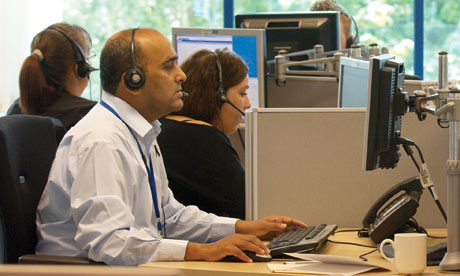29 July 2013
 |
| Photo: NHS Direct |

NHS Direct, which provides the non-emergency phone line in nine regions of England, said it wanted to quit its contracts because they were too expensive. It has found that the cost of providing the service, where staff give the public non-emergency health advice, exceeded the contract price. NHS Direct is now seeking a "planned withdrawal" from the deals after projecting a £26m deficit for the coming financial year. Its chief executive Nick Chapman said: "We will continue to provide a safe and reliable NHS 111 service to our patients until alternative arrangements can be made by commissioners.
"Whatever the outcome of the discussions on the future, patients will remain the central focus of our efforts, together with protecting our staff who work on NHS 111 to ensure that the service will continue to benefit from their skills and experience." The announcement came as an undercover investigation revealed "serious failings" in the system, with staff shortages, long waits for callers and unnecessary ambulance call-outs. In Channel 4's Dispatches programme NHS Undercover, one call centre manager was secretly filmed admitting the service was exposed at the weekends. "We had a very bad service. Still realistically on the weekends we still are unsafe. We don't have the staff to deal with the calls that are coming in," the worker said.
Reporters posed as trainee call handlers and filmed secretly at centres run by the private health care company Harmoni, which has a third of the hotline contracts in England. They found many patients had to wait longer than 10 minutes to hear back from a clinician and some workers with no medical training were filmed giving medical advice to the journalists. A spokesman for Harmoni told the programme: "We provide a clinically safe service. We expect all staff to only provide advice according to their role and their level of training and take a zero-tolerance approach to any breach. "Our audits show no evidence of widespread poor practice. Our staffing levels are extremely robust with around one clinical adviser to every four health advisers.
"While it has been acknowledged that NHS 111 services generally did not get off to a good start, we and other providers have successfully delivered substantial improvements including recruiting 180 more advisers." The 24-hour phone line replaced NHS Direct as the number to call for non-emergency care but has been dogged by problems since its inception. Patients complained about unanswered calls, poor advice and calls being diverted to the wrong part of the country. Doctors claimed its "problematic roll-out" had left patients not knowing where to turn and it has also been blamed for fuelling the current A&E crisis. Earlier this month, the Health Select Committee attacked ministers for the "premature" launch, claiming it was done with little understanding about how it would affect the wider NHS.
NHS Direct worked on the 111 pilot, which was based on a cost of £13 per call to cover staff salaries and other costs. But it says local health commissioners refused to pay more than £7.80 per call when the first 111 contract was awarded in the North East of England. NHS Direct initially won 11 of the 46 regional contracts for the hotline but pulled out of two before they were even launched. It now wants to axe the remaining nine in Buckinghamshire, East London and the City, South East London, Sutton and Merton, West Midlands, Lancashire and Cumbria, Greater Manchester, Merseyside and Cheshire and Somerset. A company spokesman said it had encountered "significant problems" when it launched the three contracts in the north west of England and West Midlands in March.
She said the calls took "twice as long as expected" and as a result, NHS Direct did not have "sufficient capacity" to handle all the calls that it received. The firm had worked on the pilot, which was based on a cost of £13 per call to cover staff salaries and other expenses, but local health commissioners refused to pay so much. The NHS Direct board remodeled its costs and decided it could bid based on £7 to £8 per call and was later awarded deals covering 34% of the country. However, its annual report says: "It is now clear that the trust is not able to to provide the 111 service within this lower cost range, and that the 111 contracts that the trust has entered into are financially unsustainable."
David Cameron's spokesman admitted there had been problems with the hotline's launch but insisted performance and patient satisfaction was now high. "He is confident that we will continue to push up standards and deliver a high level of service for patients across the country," the spokesman said. NHS England blamed the earlier problems on providers not having enough call handling capacity in place but also claimed they had now been resolved. The Department of Health said NHS Direct had "struggled to meet the standards required" but defended the hotline as a whole and vowed it would continue.
A spokesman said: "There is widespread consensus that NHS 111 is in principle a good idea. "It makes obvious sense that for many patients, accessing the NHS by phone is often the quickest and easiest way to get advice and speak to a doctor or nurse when needed. "So of course it's disappointing that there have been problems with its implementation but these are flaws that can and will be overcome."